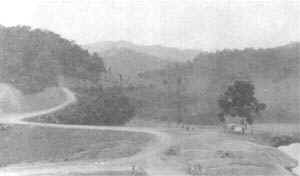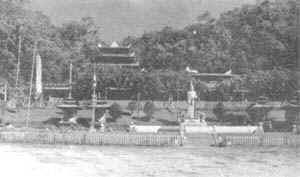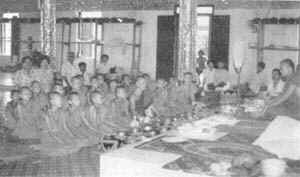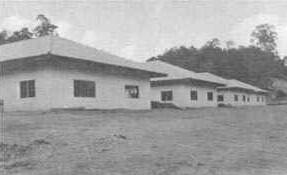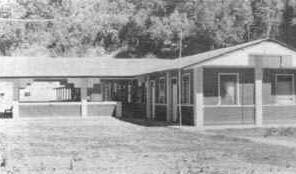| Why
Did U Khun Sa’s MTA Exchange Arms for Peace |
||||||||
|
Part II
I had read about MTA leader U Khun Sa in many newspaper and magazine articles, so I was fairly well-informed about him. But his decision to surrender unconditionally in exchange for peace can be called a truly courageous decision. If you think about whatever the circumstances, he was in fact king of his domain. That he was cock of the walk cannot be denied. From what has been reported and written about him, he was extremely wealthy and said to be living in the lap of luxury. So to obtain peace, he did have to sacrifice both power and wealth. As to his age he was just a little over sixty with quite a number years left in which to revel in a life of comfort. So what had impelled him to opt for an exchange of arms for peace? So I began to wonder about what powerful reasons and emotions had stirred up his heart enough to convince him to exchange arms for peace. I raised this question with my friend. ” My friend I’m really interested and curious about why your leader U Khun Sa arrived at this decision to exchange arms for peace. There are so many things I want to know. You lived and worked closely with him for such a long time, you much surely know a lot about him.” ” I know reading is your hobby and you probably have some literary aspirations, so do you intend to reap some cash profit out of this? “ ” That isn’t so. But you know I just had a fleeting thought would I, if I were in his place, even think about exchanging arms for peace? Ha! ha! ha!” “If you look at the situation from the ordinary, superficial point of view, there’s no way one could make such a sacrifice. But when so many factors converge to make urgent demands on you a person will ultimately reach the same decision he did to make such a sacrifice no matter who, be it you or me in his place.”
A number of U Khun Sa’s Residences at Ho Mong. “Are you trying to tell me that he was somehow propelled by some external forces to exchange arms for peace?” ”I wouldn’t exactly put it like that, but the demands of some external factors, his own inclination and yes, his courage and determination, combined together led to his decision.” “What do you mean by external factors?” “Hey go step by step with your questioning. Your first question was about U Khun Sa, right?” “OK. OK. I got carried away I suppose. But please go on. Go on.” “Before I tell you about U Khun Sa I have to make clear my relationship with him. You must realize, I’m not one of his proteges. As you know I was originally in the SURA camp. Only when the SURE joined the MTA due to various circumstances, did I become one of its members. And I’m pure Shan. He’s Chinese with a mixture of Shan blood. We are not of the same stripe. There are things about him that I like and certain other things I disapprove of.”
A Cedi built by U Khun Sa, on a hillock near the Ho Mong Dam. “Yes, sure, I know that.” “Anyway I’ll try to make my assessment as fair and close to the truth as possible. You already know about past events and facts about his past. What you can’t possibly know were the changes that took place latterly in his outlook and situation.” “That’s right my friend, that’s it. What I want to know most about are his reasons for exchanging arms for peace.” “You know ever since the State Law and Order Restoration Council assumed State Power, he watched the Government’s telecasts, daily. He was observing and studying the Government’s professed goals and actions taken” “Aw !” “Don’t tell me, you in your jungle hide out had access to TV broadcasts.” “Don’t be naive, do you think U Khun Sa’s headquarters was just a huddle of rickety huts, like the scenes shown in your teleplays. The more than 1000 buildings that made up our headquarters were planned and laid out in accordance to town planning specifications and requirements. There isn’t a single bamboo hut, and water and electrical power supplies are available 24 hours a day. We also had 20 phones with international access (IDD phones . So don’t even talk about TV.”
The Ho Mong Dam constructed by U Khun Sa. “O.K, O K. Just continue.” “About 2 years after the State Law and Order Restoration Council assumed power, U Khun Sa’s way of thinking and attitude began to change. The main cause was the implementation of the peace initiatives by the Government. We acknowledged the fact that once the military government had given it’s word it has never failed to follow up with the appropriate action and that it was a government that worked indefatigably.” ” Do you mean to tell me that this was what made him exchange arms for peace?” ” No, how can it be? Even though he realized all this he launched a large-scale attack on Government Forces at the instigation of this person Peter Bourne. I’ll tell you about this later. But as I said, about two years after the State Law and Order Restoration Council came into power, he began to seriously think about whether he wanted to end his life as a drug lord.” ” Is that possible? At the time in Ho Mong, he had you know, what we call Queen of the Southern Chamber and Queen of the Northern Chamber and so forth, Ha! Ha! Ha!” ” In this world a man may be living in lap of luxury and be enjoying worldly pleasures, but that doesn’t mean there is contentment. Age and health had taken its toll on him and the experience of a lifetime enabled him to see things in the right perspectives. You know I’m not trying to speak in his favour and for me he’s not a god on a pedestal that I worship. In fact, racially speaking, there’s a lot that I resent. But as I told you, I’ll try to give an objective assessment of him. You might or might not believe what I say. U Khun Sa is still alive, so you can check with him in person.” ” Why shouldn’t I believe you? I trust your integrity and sincerity.”
” Well then, as I said, U Khun Sa had begun to think along these lines. He had this desire to close the last chapter of his life with a good name to remove the black marks of the MTA by doing something good and worthwhile for the country. To put it another way, he wanted his life to end on a good historical note. He then began to wonder about a suitable time to put his intentions to the test. After studying the activities and achievements of the State Law and Order Restoration Council he decided the time was ripe for him if he wished to end his life on a positive note.” ” Ha! Why? This Government had consistently attacked him as the Number One enemy.” ” You mustn’t entertain shallow, superficial thoughts like that. Didn’t you hear what the Secretary 1 said when news leaked out that America intended to enter the country to capture him and put him on trial? The Secretary 1 said unequivocally that no foreign power would be permitted to encroach even one inch on the country’s territory and that we intended to resolve our internal problems ourselves without interference by any outsiders.
The lapidary at Ho Mong. Leaving that aside, it was quite obvious that this Government was not a stooge of the western bloc and that it would never take orders from the west. So, to be frank, this Government which regarded U Khun Sa as the No. 1 enemy would never give in to the American Government’s demand that he be handed over to them. It was obvious the Government would certainly not comply with such a demand. He was firmly convinced of that. There was another thing he used to repeat quite often. He frequently said that this was a Government that kept its word and did what it said it would.” ” Did he really see his enemy in this light? And when did such thoughts begin to enter his head?” ” Oh you dummy he’s a leader, don’t you forget that. One becomes a leader only if he has certain special qualities. And look at the number of years he has been a leader. Of course he didn’t get these ideas just from watching TV. You must remember that he had already entered his sixties. And with age there were telltale signs of declining health maladies like diabetes and hypertension had begun to set in. How could he be expected to be as active as in his early forties? No matter these were the small fringe factors. There were other more significant and pressing reasons.” ” Could religion have prompted him to think about exchanging arms for peace?”
” To be quite honest U Khun Sa is a Buddhist in name only. He himself donated and built a pagoda at Ho Mong MTA headquarters. He established a large teaching monastery with over 100 members of the Sangha. He sponsored and encouraged all this and made plans to build both the pagoda and the monastery himself. He also took the lead in the celebrations of traditional Buddhist festivals. But it was not out of any deep conviction or understanding. But after he had entered his sixties I suppose you could say he had begun to show some interest. But, I can tell you with absolute certainty that it was not religion that made him repent and exchange arms for peace. ” Then is it because he is now a millionaire as we have heard? “ ” That’s even more unlikely. I heard all these rumours too. When we first came in there were a lot of these rumours flying around, like how the price of gold had shot up because U Khun Sa and his people had bought up all the gold; that U Khun Sa had been granted licence to import 1000 buses. No matter what, U Khun Sa was responsible for the hike in prices. There were stories about his inexhaustible hoard of gold and dollars. Actually, at the time of his surrender U Khun Sa had nothing. “How can that be? He was so notoriously rich.” ” That’s exactly what I’m trying to clarify. The western bloc nations thought the same thing and even accused the Government of laundering his money for him. He was accused of having a stockpile of dollars in his possession. If the CIA and DEA had made these wild accusations in spite of the fact that they had no solid, reliable evidence, then both these organizations must be really inefficient or feeble-witted. If, however, these accusations are just part of a deliberate attempt to slander our Government, then of course I have nothing to say. It’s a fact that the MTA earned a lot of money. But U Khun Sa was such a spendthrift that at times he had to borrow money for expenses. What you believe and what is fact are two entirely different things.” ” I suppose I must take what you say at face-value, but I’m still not fully convinced.”
A Department Store and Bazaar Stalls. ” In that case I’ll have to explain how the money was earned. You already know about the proceeds from drug trafficking. But there are still things you are not aware of. We earned a lot of money from timber. Then there was the sale of gems when the gem mines at Mongshu started production. Gems w ere smuggled out to Thailand and there was a thriving daily gem market at our headquarters in Ho Mong. That included jade too of course. We were paid a commission and could also participate in the trading. Smuggling of cattle daily brought in a four-figure income. We also levied taxes on other contraband. In same cases taxes were extorted from the village to township level. So there a was vast total income daily.” ” Tell me something of the amount you earned from drug trafficking.” ” You people seem to think we earned fantastic sums from drug trafficking. It’s really quite ironical. As U Khun Sa said ‘no matter how much the size of the consignment of narcotic drug seized or whether the seizure was in Thailand or any where else, the answer always remained the same, the drug comes from Ho Mong and the owner is Khun Sa.’ This stopped all further questioning. That’s how U Khun Sa became known as the drug king. In actual fact he was not the sole operator or sole owner making profit. He may have had his own personal share but the profits were mainly for the organization. I don’t deny that there ~as a large inco1ne from drug trafficking. But I want you to also Understand how this money was spent. “ “Yes go on” “About 2 years before our surrender our Ho Mong head-quarters was rebuilt as a city in accordance to city planning rules and relations and the cost came up to about 300,000 bahts. An all season dam for water supply and hydro-electric power was built at a cost of 12 million bahts. The hospital cost another 24 million bahts. Then there were new roads, a market, a park as well as residential housing for members to be paid for. The cost was enormous.”
“Hey you’re talking about building a whole city.” ” When I said to U Khun Sa that we were rebels and should therefore live accordingly, he replied that the Government was engaged in many construction projects. So if the Government should attack us and take over one day, he said they would find everything they needed. I didn’t know what he meant at the time. But maybe he was already contemplating and planning his next move. Believe me U Khun Sa is a really determined man. No one can stop him from doing what he wants. By hook or by crook he gets things done.” ” He sounds a strange character.” ” He is also generous to a fault. Every year on Chinese New Year, he spends over 2 million bahts on cash gifts ( i.e. An Poung) for every one, including the lowest foot soldier. As the saying goes’ generosity begets a loyal retinue.’ The strength of his group lies in this positive side of his character.” “If he can afford to spend so much, he must have some personal wealth.” ” How can he be wealthy when he spends money like this? I told you that he had to borrow money sometimes because his expenses exceeded his income. People thought that after his surrender he would set up large business enterprises with his ill gotten gains and live in comfort and luxury. But he is having to borrow money from the Government for his daily needs.” ” I have faith in you but I still cannot fully believe this.” ” History is the best witness and one day the truth will be revealed. But I dare to say here and now, that the reason he exchanged arms for peace was not because he had amassed enormous wealth and wished now to live a life of leisure.” ” So then go ahead and convince me.”
The Ho Mong High School and Church. ” Wait, I’ll come to that. The MTA did not surrender because of military defeat. Nor was it because U Khun Sa had vast wealth. It was neither religious atonement nor an act of repentance. Nor had some other country exerted pressure on him to surrender. First your Government laid down what I suppose could be called its National Policy in the form of the Three Principal National Tasks. Then it worked tirelessly for national unity and solidarity and opened the way to peace. The effect of these actions, which we think were right and proper, spread nationwide and exerted appositive influence on the people. It also affected U Khun Sa’s thinking in a very positive way. He was getting on in years and was pondering the best way to exit life when the time came and this coincided with the calls for peace. It changed his whole outlook. So this could be the principle factor that later led to the exchange of arms for peace.” ” I’m keen to know about the other contributing factors but you keep going back to the main motive. “ ” I’m coming to that, but don’t rush me. So while he was thinking along those lines, some foreigners, most of them Americans, attempted to incite U Khun Sa to attack the Government. The biggest culprit was one Peter Bourne who had been Adviser on Narcotic Drugs to the US President during the Carter Administration. At his prodding, U Khun Sa ordered the MTA to launch a full-scale attack on Government Forces in the Monkyut region. Later in 1995 they attacked the Hpet Tu Mein region and even the town of Tachilek. There was really heavy loss of life and many were wounded. Nothing was gained from this aggressive move. It was at this point that U Khun Sa came to realize how utterly futile and meaningless these actions were. To put it briefly he learned a lesson the hard way, that there was no way to match the military strength of the Myanmar Armed Forces. At this critical moment in June 1995, a minor Shan leader and political commissar of MTA No.16 Brigade Kan Ywet defected from the MTA with over 200 members. Almost overnight other Shan members of the remaining brigades broke away to ally themselves with Kan Ywet. The total number of defectors was between two to three thousand men.” ” What was the reason for this defection?”
” Don’t be hasty, wait a moment. Let me continue what I was saying. The idea of exchanging arms for peace by then had begun to germinate in U Khun Sa’s mind. Added to this, the defection of Kan Ywet with quite a few Shan members of the MTA was indeed the last straw. It was at this point that U Khun Sa began preparations for the exchange of arms for peace. That’s about enough for today. I think, it’s time for a break.” This round of conversation ended there because my friend said he needed a rest. But I came away with questions still unasked. There were so many things I was eager to know. It also occurred to me that this person, world notorious and infamous as a drug king, did have some redeeming vestiges of a nationalist spirit. |



